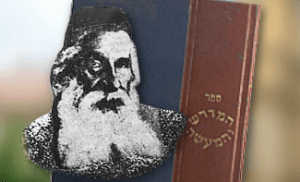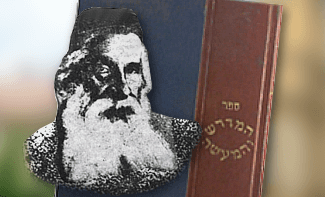
If there be a destitute person among you…you shall not harden your heart or close your hand against your destitute brother.[2]
Chazal offer a formula for success in a mishnah in Avos: “Make His Will your will, so that He will do your will, just as He does His. Negate your will for the sake of His Will, so that He will set aside the will of others for the sake of yours.”[3] We would be tempted to see the two sentences as closely related. This does not really work. The two lines deal with very different expectations. The first declaration speaks of joining the individual’s will with that of His Creater; the second deals with overcoming his resistance to G-d’s directives.
I believe that the two statements involve two different classes of commandments. Chazal caution us not to react to prohibited items as if they were naturally repugnant. “Do not say ‘I could not possibly eat pork.’ Rather say, ‘I am drawn to it. But what can I do? My Father in Heaven decreed against it!’”[4] They would say the same about affirmative obligations. A person should not claim that he has a natural inclination to wear tzitzis and tefillin. Rather, he should say that he could quite well do without them, but he dons them because HKBH tells him to.
While this approach makes sense in regard to commandments between ourselves and Hashem, it would make no sense to apply it to mitzvos between man and man. It cannot be that a person should say, “I find tzedakah and chesed to be abhorrent. I cannot abide the sight of a pauper. I give to him nonetheless because Hashem demands it of me, and I force myself to comply.” To the contrary, the inclination towards chesed is itself a mitzvah! We are told to emulate the midos / characteristics of G-d. This means internalizing known traits of HKBH, and making them part of our personalities. Just as He is compassionate, we are to be compassionate as well – not just to act as if we were.
The meaning of the mishnah in Avos should now be apparent. Regarding mitzvos that are rationally accessible, such as many of the ones governing our conduct towards our fellow man, we are told to make His will our will. We should imitate His ways, until the midos that generate those ways become part of our nature. When we internalize His midos of chesed, His will becomes ours.
On the other hand, we never strive to develop an innate revulsion to many of the things prohibited to us that concern our relationship with G-d, rather than Man. To the contrary, we are to see ourselves as restricted only by His edict, and nothing else. Regarding these mitzvos, the best way to observe them is by battling our own desires, and negating them for the sake of His will.
Our pasuk offers a ready hint of this. “You shall not harden your heart or close your hand against your destitute brother.” Now, the second item seems to be what the mitzvah is all about. Don’t close your hand, the Torah instructs. Give generously. What does the Torah mean by the first phrase? It tells us not to treat the mitzvah of tzedakah like a strip of bacon. Regarding the latter, it is commendable to want it, but to refrain because of Hashem’s commandment. Not so in regard to tzedakah. If a person opened his hand while his heart remained hard, he has not properly fulfilled the mitzvah.
Chazal[5] add a curious and cryptic postscript to our pasuk. “There are people who are pained to give, and those who are pained not to give.” It may be a cogent observation, but where do they see this in a pasuk instructing us to give? Once again, the source is the unexpected phrase about hardening our hearts. Chazal tell us that the point of these words is that we must not only give, but we need to internalize Hashem’s beneficence and kindness as well. Giving is surely important, but we should not neglect our goal of becoming more like Him. Chazal understand that the Torah stresses the importance of improving our inner reaction to tzedakah because people react differently even when they give. It is hard for some people not to give, while for others, the opposite is true. Those people who give with great inner struggle are targeted by our pasuk: Besides giving, learn how to soften your heart as well.
We can readily understand why it is difficult for some people to give. Many people work very hard for their earnings. There is natural reluctance to share them with those who did nothing to deserve them. Overcoming that reluctance is important. We can therefore also understand why the Torah’s first instance of mandatory giving – the machtzis ha-shekel – functions as atonement[6] for getting past that resistance.
It does raise other questions, however. Calling the machtzis ha-shekel donation an atonement seems to fly in the face of the gemara’s[7] principal that “an accuser cannot become a defender,” i.e. something that symbolizes a spiritual failing of the people cannot play a role in propitiating HKBH for more favorable treatment. Now, it is recognized[8] that a surfeit of silver and gold in their possession led the Bnei Yisrael to make the Golden Calf. Why then should a cash donation change roles? How does it move from the role of accuser to that of defender? We can also turn around the question. Why should this principle ever apply to silver and gold? They should be treated as exceptions to the rule, because we see quite clearly that they function in both roles! The pursuit of riches contributes to the downfall of untold numbers of people. But the proper use of wealth accomplishes untold good! There is no way to deny the dual role of money as facilitating much that is evil and much that is saintly.
The gemara considers what looks like violations of the accuser-defender rule, and resolves the tension by differentiating between avodah that is performed “within,” i.e. in the kodesh kodashim, and what is performed outside. The kohen is barred from donning golden garments – reminiscent of the Golden Calf – only when he serves “within” the Holy of Holies. At other times he dons the ordinary garments of the kohen gadol, including the ones that used gold!
The distinction between “within” and “without” can address our chief outstanding question as well. We sometimes stand “outside” and look in at our community – especially noting its faults, and what needs to be improved. When we note the human rubble left after silver and gold is misused, we point to its proper use on different occasions. It is as if we declared, “We’ve risen above all the bad stuff. Money does not tempt us enough to commit aveiros. It hasn’t blinded us.
This argument is satisfactory for the person standing “outside,” removed from the presence of the Shechinah. It will never do for those standing “inside,” those seeking to attach themselves to Hashem’s presence. A relativistic argument – that we are not so bad because we could be doing much worse – would be an embarrassingly deficient. In the inner sanctity, in the space in life where we try to get closest to Hashem, only sterling purity will do. Unfortunately, there the silver and gold of our lives point an accusatory finger at our failures.


